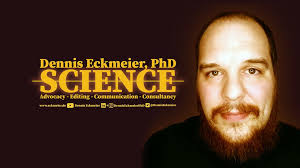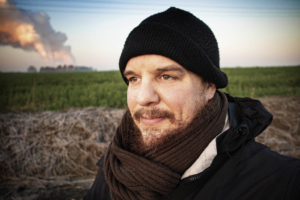For our current theme on Science and Sound- we are happy to introduce you to Dr. Dennis Eckmeier, neuroethologist, freelancer in science editing, communication, advocacy and the man behind “Science for Progress.”
Thank you for doing this interview, please tell us a bit about yourself.
My name is Dennis Eckmeier, and I have a Ph.D. in neuroscience. After about 12 years researching animal behavior and its neural underpinnings, I switched to being an independent scientist. I mostly freelance in science communication and academic writing.
I discovered my love for the biology of animals very early in life and – despite rather mediocre outcomes in secondary school – decided to study biology as a teenager. Undergraduate studies were difficult, since I hadn’t learned to study at school.
Thankfully, I do rather well at research, leading to an acceptable grade in my pre-Bologna-biology degree in 2006. I majored in Animal Physiology, which at Cologne University (Cologne, Germany) meant neuroscience. For my “Diplom” thesis, I studied alternating courtship calls in Chinese fire-bellied toads and attempted to understand how the brain produces these calls.

I moved on to a Ph.D. in neuroethology (Bielefeld, Germany), studying how zebra finches may use visual motion to perceive spatial depth. I graduated in 2010 and then became a postdoc. First, I studied how neuromodulation impacts social learning in mice at Cold Spring Harbor Laboratory in the USA. Then I moved to the Champalimaud Foundation in Portugal to study how mice control locomotion.
I decided to leave research because I felt my experience had outgrown the demands of my postdoctoral work, but I had not published enough articles to apply for professorships. (More about this here: https://recoveringacademic.net/season-3-episode-4-interview-with-dennis-eckmeier/)
After leaving academia (and moving back to Germany), I wanted to be independent. So, I now apply my knowledge and experience as a freelance editor and science communicator. I continuously work on my portfolio while I continue to learn more about communication principles, podcasting, video making, and writing.
You started your podcast “Science for Progress” while being a postdoc in Portugal. What motivated you to start this podcast, and what was your idea behind it?
The idea of “Science for Progress” is to sensitize academics to their role in society. I believe that science is the best method for understanding the world, and inform decisions. Because of that, academia – the institution and community that creates such understanding – has responsibilities. First, it needs to provide researchers with optimal working conditions. Then, it needs to ensure rigorous, ethical, and socially responsible research practices. And finally, it needs to effectively reach out to support public / democratic decision making processes. Each of these issues encompasses a whole spectrum of topics.

I started this project as a continuation of the March for Science in 2017. I joined the organizer team for the satellite event in Lisbon, Portugal, and it was a great experience. I quickly dumped the plans for big real-life events, because few people volunteered to help.
So, I was searching for activities that – I thought – wouldn’t be too time-consuming, while still having a potentially large reach. Hence, the idea to make a podcast. I figured out how everything works and published the first episode in February 2018!
What were your struggles at the beginning of your podcaster path?
There were very few struggles – all thanks to YouTubers and Podcasters who explain how to make good podcasts, where to host the podcast, and how to have your podcast distributed to all the podcast apps. Also, you can start on a minimal budget!
The real hurdle for me was to overcome perfectionism. If you want to do something on a regular schedule, done is better than perfect. If you don’t like something about your current episode, do it better in the next episode. I DO still spend (too) much time on each episode, though.
When you start, don’t put too much on your plate. My initial goal was to publish once a month, then later increased it to twice a month. For this year, I had big plans increasing the frequency to weekly, but I am struggling with it. I will probably go back to publishing twice a month, soon.
As for equipment, I initially borrowed a USB microphone from the Science Communication department, plugged it into the laptop, my guest and I sat next to it, and we just had a conversation. I recorded and edited it using free software, and I added artwork and music using free software, as well – all the art was custom made by myself. Since then, I have been improving the podcast step by step as I produced more episodes.
Today, I use professional proprietary software, a digital recorder, studio-quality headphones, studio microphones, and I learned a lot about sound editing. The next issue I want to address is the guest’s sound quality in remote interviews. I found some advice on what guests are willing to do and will try implementing it soon!
What I like in your podcast is the diversity of topics: you interviewed scientists working on sensitive subjects, activists, science communicators… Do you have any criteria regarding your guest?
I have two criteria for my guests: they need to have something relevant to say, and they need to be willing to talk to me. I try to mix topics up and I often look out for people on Twitter, but I also take referrals, and some guests actively approach me. Currently I am doing a series on “Scientists for Future”, a politically active group of scientists that was founded in support of “Fridays for Future”, and communicate with both the public and the government about climate action.
I also want my guest list to be diverse. I invite women and men about equally often, and I try to have them come from different countries. I think, so far, I was able to have the right mix. Academia is international, and the experiences of academics from different parts of the world are comparable. The series on “Scientists for Future,” though, means I currently have a bias towards German scientists.
More recently you started discussion episode with your co-host, Bart, on current matters (CRISPR Babies, COVID conspiracy myths…), how do you choose your next topic of discussion with Bart?
With my co-host, Dr. Bart Geurten, I have a conversation episode about once a month. I’d say most of the time it is Bart who suggests the topic. It’s usually something related to current events that also fits into our overall theme, or we talk more about the subject of the previous interview episode. It’s rather spontaneous.

Do you have a favorite episode?
I have had many fantastic conversations! Sometimes I quite liked the guest, sometimes I learned a lot, sometimes it’s because we addressed a particularly important topic – and of course any combination of these. I certainly would recommend listening to an early episode with Björn Brembs, where we talk about the Journal Impact Factor. It is very relevant to researchers, and it’s the most downloaded episode so far. But many other episodes are just as relevant for different reasons.
Since the start of the podcast, you finished your postdoc contract and became a freelancer in scientific editing, communication, and advocacy. Did your experience as a science podcaster motivated you toward this career path?
I do think the podcast had an impact on my choice to enter science communication, yes, but I was also interested in communication (academic or public), before the podcast. More important for my decision was, however, that science communication and academic writing appeared to be the most independent professions. For my whole postdoc career I had been aiming to become an “independent researcher” and I may now be more independent than most professors. But, I also considered data science for a while, and I applied for a consultancy job for a Silicon Valley company that sells state-of-the-art neuroscience research equipment – I didn’t get the job, but I could still imagine doing it.
Importantly, I don’t earn money with my podcast, and I think that it is tough to create a podcast about science that financially supports itself. Most science podcasts will remain vanity projects of institutes or companies for PR, or personal hobby projects. I am very grateful for my supporters on Patreon, of course, but my income covers only a fraction of my expenses, let alone my work hours. It’s still a volunteer project.
You also started a Youtube channel on academic writing. How different is the video format compared to your podcasting experience? Do you favour one?
Overall, I like both podcasting and video making a lot. Podcasts have a very personal feel and you can listen to them while doing something else. You don’t need to watch the screen. But, because you can show things, video has an advantage when trying to convey information. On the other hand, video is much less forgiving of lack of preparation or weak performance. So, even though the videos are much shorter, they are more work: The sound needs to be just as good as for a podcast, but you also need to consider lighting, framing, motion, transitions, color correction, and animations. Of course, if all you want is a talking-head-vlog for yourself, you can get started with video as quickly as you can with podcasts.
If you are trying to decide between video and audio, you should really think about which medium will fit your plans and personality better. For example, I personally find one-on-one interviews better in audio-only, because the video usually doesn’t add much. On the other hand, I think tutorials are better on video, because you can add animations and pictures. A motion picture is worth 1000² words!

Let’s dream outside this pandemic nightmare and tell us what your dream would be?
I have many projects on my desk in different phases. At this point, anyone of them turning into an income-generating reality would be fantastic. One long-time dream would be to produce a neuroscience podcast and YouTube series that conveys neuroscience basics while focusing on understanding animal behavior. I could also see myself teaching academic writing to graduate students, maybe write a book. I do not lack ideas and vision!
A last word/piece of advice for our readers who might want to start their own podcast?
Don’t hesitate! All you need is a mic (you can record with your smartphone) and a computer – well, and something to talk about. Get basic tips from the many free tutorials online, learn by doing, talk to other podcasters! Most importantly: do it because you like to do it, not if you desperately need to make money (unless, of course, you are safely employed, so somebody else is taking the financial risk).
Where to find Dr. Dennis Eckmeier
- Prof Christophe Bernard eNeuro Chief Editor – A video interview - September 5, 2021
- Tim Ward from Intermedia Communication – a video interview - November 4, 2020
- Sign your Science - September 22, 2020
- Dr. Dennis Eckmeier
– Science for Progress Podcast - August 20, 2020 - Raven the Science Maven - August 18, 2020
- Dr Mark Temple: DNA Sonification or when Scientist are musicians - August 5, 2020
- How we hear and brain trickery - July 3, 2020
- Be a Master of Scientific illustration - June 26, 2020
- Dr Tullio Rossi Animate your Science- a video interview - May 30, 2020
- Infographics and Covid-19 - May 3, 2020



